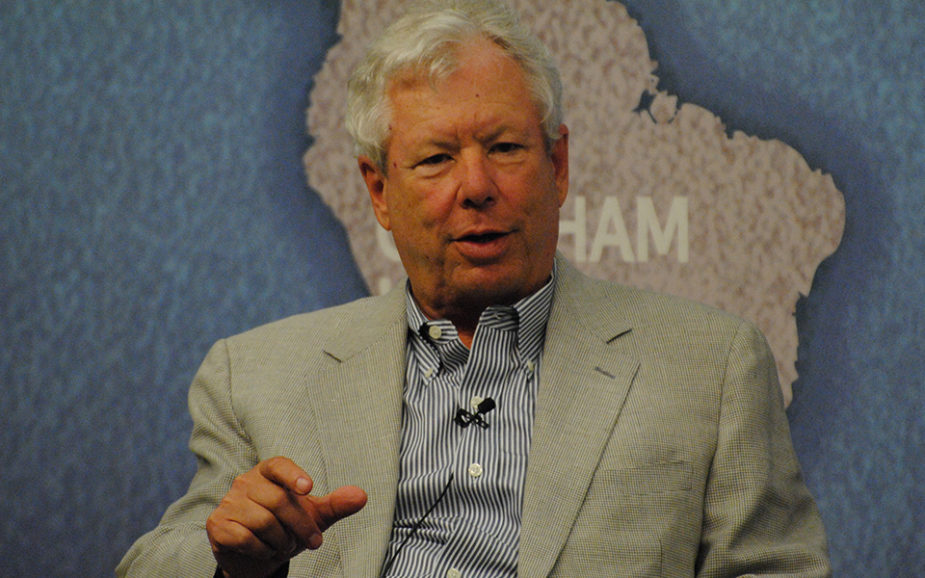Nobel Prize in Economics: "The single currency is increasingly questionable"
The high costs of implementing the euro for countries such as Greece lead Richard Thaler to question whether it makes sense. In an interview, he considers that the costs of currency transactions are becoming less and less important as the economy moves toward the end of physical money.

Criticized throughout his career for incorporating psychology into the analysis of economic decision-making, Richard H. Thaler won the Nobel Prize in Economics last year. In an interview with the Economic Journal, he explained that the implementation of the single currency, such as Brexit or the economic crisis, results from bad decisions prompted by nudge, the term on which his theory is based.
Thaler, who is a researcher and lecturer at the Booth School of Business at the University of Chicago, has dedicated life to show how human beings are influenced by emotions and irrationality in all decisions they make, but whether irrational human behavior can be predictable , then it can also be incited or stimulated.
Classical economic theories are based on the rationality of human behavior and their work has been the subject of much criticism. What does it mean to receive the Nobel Prize for Economics in this context?
- Obviously, it is very gratifying to receive the Nobel Prize in Economics after being considered a mad stranger for so many years. I think a lot of credit goes to the many young and brilliant behavioral economists who have joined the team over the years. There are now too many strong results to ignore.
How can nudge theory lead to smarter decisions?
- The push mechanism is what we call the "architecture of choice“, which is simply the environment in which people make decisions. Numerous studies have shown that the small features of this architecture of choice, such as which items are most prominent or labeled as the 'standard' option, can strongly influence choices. When people are not sophisticated and have trouble making choices on their own, well-designed standard options can be very useful.
But can it also be used to detrimentally influence others?
- Yes of course. When someone asks me to sign a copy of my book, Nudge, I always sign: "push for good," which is an appeal. But surely companies can use the same principles to get people to make poor choices that are profitable for the company. Learning about the “nudge" can help people avoid such pitfalls.
Behavioral economics gained prominence during the financial crisis due to poor risk decisions taken. Can nudge prevent new crises?
- The financial crisis was caused by poor decision making at all levels of the economy. The creditors obtained loans that they could not pay back unless real estate prices continued to rise. Lenders offered such loans because they could quickly 'reverse' and pass the risk to others. Rating agencies looked at bad loan portfolios and labeled them low risk. And so on… In the future, policies should be implemented that apply smoothly to those sectors of the economy that are rapidly increasing, mainly based on leverage.
You have been quite critical of Brexit and warned of risks and consequences. Is it an example that proves your theory?
- I do not know if Brexit "proves“ anything, but I think it's a good example of a decision that relied more on emotions than on rational economic calculations. I have yet to meet any voters who have voted for the UK to leave the European Union that had a spreadsheet, which shows how it would be best for economic well-being. Instead, I think the voters were just saying "we're upset and we want change“.
What other examples of bad decisions with global implications can you identify?
- Frankly, if the euro as a single currency makes sense is increasingly questionable to me. Clearly, it imposed severe costs in countries such as Greece during the crisis, but, generally speaking, when we are moving to a society without money, exchange costs are becoming less important. On my recent visit to Sweden, I have never seen a Swedish krona.
You spent 30 years researching behavioral economics. What are the next studies you are working on?
Coincidentally, I have been working on some research on the Swedish social security system. Partially privatized the system in 2000, creating individual accounts for each worker financed with a 2.5% payroll tax. There was a standard fund chosen, but the government encouraged people to reject it and choose their own portfolio from the 450 available funds.
A large advertising campaign supported this nudge to choose a portfolio and two thirds of the population followed this advice in 2000. The most interesting result is that almost all of those who chose in 2000 are still in do it yourself mode, but almost none of the new workers entering the system actually adopts that choice, less than 1%. Interesting! This is the research I have in progress.
Thanks for your time!
If you appreciate the work I´m doing:
